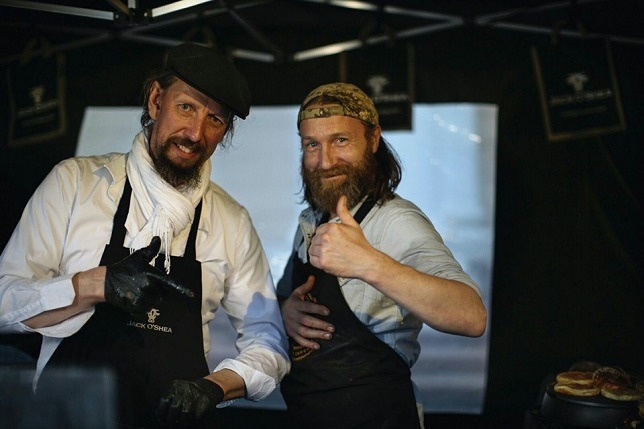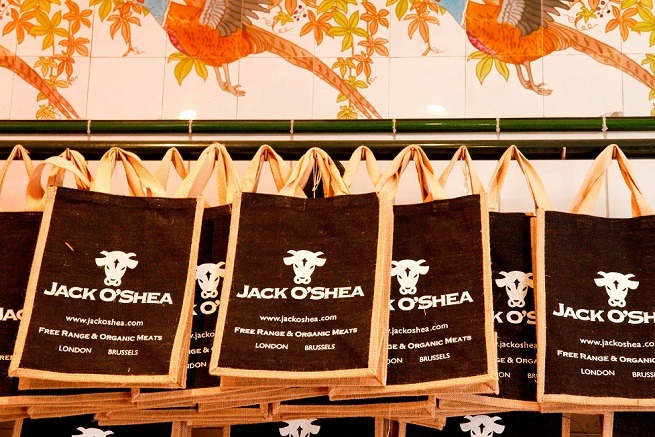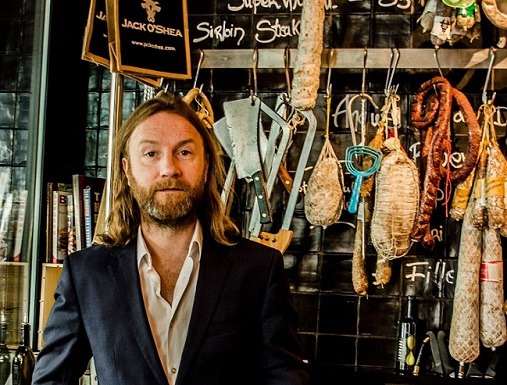After he disappeared more than a year ago, Brussels’ star butcher is still an icon among the expat community. Everybody knows that he had some kind of accident and that his business went bankrupt shortly after – all the newspapers talked about it in early August last year. But in fact Jack himself was not at the time physically able to tell anybody what had happened, let alone manage his business. Now, a year later, we have the story.
Jack O’Shea’s life brutally collapsed in the night between 9 and 10 April 2016, when he fell from a roof terrace on the first floor of his hotel in Darmstadt, Germany. After a day of selling hamburgers at a fair, he came back to the hotel with his team and had a smoke on the terrace, which was only accessible from the window of a room on the first floor. “He fell asleep and then he fell from the roof,” said Eric Chapuis, a key witness who later played an important role in the story. Jack fractured two cervical vertebrae at the base of his neck and had to undergo emergency surgery at the Darmstadt Clinic a few hundred meters away, before being transferred to Heidelberg University Hospital ten days after. The prognosis was severe: progressive paraplegia. His medical condition subsequently worsened with severe respiratory issues and pneumonia. “Jack was dying,” Chapuis remembers. An old friend who came to see him in Heidelberg reported that he was “in terrible condition”, encircled by a breathing machine and tubes. He was “completely paralysed” and “only his eyes could move.”
9 April 2016, a few hours before Jack's terrible accident. Jack (to the right), together with his partner in business Tassilo Münch at the BE Street Food Festival where Jack had a booth.
When I met him later at a specialised clinic for spinal cord injuries near Bonn, he had not recovered many of his physical skills and moved about in a wheelchair. But his mind was sharp and his desire to return to business intact: “I don’t accept the prognosis of the doctors that I will be this creature for life. I’m as determined in my wheelchair as if I were standing in front of them.”
Virtual bankruptcy
Nevertheless, the accident was just one dramatic episode in the Jack O’Shea saga. His problems had started earlier, in London, when Selfridges closed his meat counter just before Christmas 2012. At the time, he owed his meat supplier JF Edwards some £200,000. “I should have gone bankrupt,” he admits. But he didn’t. After selling from a small counter at Smithfield meat market for a while, he came back to Brussels, where his butcher’s shop at Schuman had been doing well since 1998.
With the help of his Brussels lawyer, Quentin de Bournonville, Jack created two companies: Flat Iron Management Ltd (FIM) to manage all of his businesses and a separate company called Auroch to manage his brand and logo. He is 100% shareholder of both companies. The idea was to pay back his debt to JF Edwards through FIM by buying all the meat from his wholesale shop Jack O’Shea Smithfield with a premium of 30%, paid back to JF Edwards by FIM. But to reduce such a huge debt, Jack needed to expand his business in Brussels. Buoyed by the hype of his excellent reputation among expats, he opened new shops in Rue Sainte-Catherine in the centre of Brussels and later one in Uccle. The shops were never profitable. The management of accounts and stock, plus the quality and staff, were chaotic. Relationships with banks and suppliers deteriorated quickly. Payments to the government (VAT, social charges and taxes) got delayed. Seen from above, the “little empire” was a big mess. “I’m a salesman, not a manager,” Jack admits today. While the virtuoso butcher lived like a rock star, his ship was sinking fast. His chophouse finished the job.
Doomed chophouse
It was “the dream of his life”, as an ex-staff member described it, i.e. Jack would open it at all costs. And he did. However, the fate of his chophouse in Rue Sainte-Catherine was doomed from the start, with its opening delayed by almost a year and hugely budget overruns. After a year of works, the dream was still nowhere: “Everything was substandard workmanship. The money spent was ridiculous for what [Jack] got,” says Paul Cardon, a craftsman from London called in by Jack to take over the works. Jack had overspent an estimated half a million pounds, but his problems didn’t end there. Cardon explains: “I couldn’t solve everything. There were too many faults. The only way would have been to close and restart, but there was no money left. The chophouse had to operate.” AFSCA, the Belgian federal agency for health & safety in the food sector, pointed to several shortcomings and never gave its green light to the chophouse.
Jack was a minority shareholder there. According to senior staff members and Jack himself, his lawyer, de Bournonville, was, in practice, running the place. But in spite of its apparent commercial success – it was always packed – the operation of the chophouse was far from flawless: here too, there were serious shortcomings in management. Just before his accident, Jack said he wanted to have Porterhouse, an Irish firm that already had restaurants in London, Dublin and New York City, manage his chophouse in Brussels. “I wanted to put in place a proper team to manage the main office efficiently and remove investors from the management team,” he explains.
In addition to its intrinsic flaws, the chophouse became the central focus of a fierce power struggle between Jack and his “investors”. Their plan, called sweetbread, was to prepare the way for yet another investor to take over all Jack’s businesses, chophouse, shops and brand. This was too much for Jack. “They wanted my intellectual property,” he says. “They were actively trying to sabotage my US and global projects.”
He was working on an alternative plan to generate cash to inject into his business in Brussels and dilute the shareholders’ hold over the chophouse. Jack had a project in the US to open a chophouse in Manhattan, managed by Porterhouse. The US chophouse would be the “launch pad” of Jack’s US operations, which included raising cattle in Nebraska and selling meat to US households through QVC, a giant American broadcast network specialised in TV home shopping. He had also started a promising business with a German partner selling hamburgers at festivals across Europe through stalls named after him: “Jack’s Shack”. The Darmstadt fair was its official inauguration.
Business in pieces
When his accident happened, it put all plans on hold and another player, Eric Chapuis, entered the story. Chapuis says he was “Jack’s best friend” at the time. First and foremost a computer systems expert, Chapuis was with Jack when he had his accident in Darmstadt. Soon afterwards, he proposed helping Jack, then paralysed and unable to talk, run his businesses. Jack signed a power of attorney making Chapuis director of all of Jack’s business interests. The deal in the US was never signed. However, when Chapuis came to Brussels, he recalls that “the situation was dramatic”. Suppliers wanted cash, staff members were not paid on time (and some of them did not even have proper contracts), the accounts were far from transparent and the meat supply was chaotic. “The sales were there but the meat wasn’t,” Jack sums up. Chapuis desperately tried to plug the holes but the ship was sinking fast. The chophouse, “bankrupt before it started”, officially went bankrupt in early August of 2016. Soon, most of Jack’s other businesses followed suit.
In Brussels, Jack’s business is now in pieces. The Schuman shop was recently declared bankrupt and the building sold. However, Jack is keen on getting back in business. “I’m encouraged by the correspondence I received from friends and customers. I miss them and I’d love to in some capacity get back in” he says.
For the time being, Jack may restart in Ireland, where he got back in touch with his brother, also a butcher, who raises cattle, sheep and pigs. He is finishing the current phase of his therapy in Dublin. So far, daily rehab is “tough” for the irrepressible butcher. He is fighting to win back the control of his limbs. So far he still can’t move his legs and his arms are only slowly recovering. His debt to JF Edwards has been paid, but the price was huge.
Always hurried when he was in Brussels, Jack now has time to reflect on how he managed to blow a business based on a luxury food product that his fans were ready to pay a premium for, influenced by his undeniable charisma and energy. There are still many mysteries to uncover, not the least the role and responsibilities of his closest partners in business. In any case, Jack has a lot to learn from this experience before reviving the black and white logo that retains its image for excellence among so many Brussels expats.
The Story of Jack O’Shea’s - Rebuilding a meat empire from scratch

By Hughes Belin
